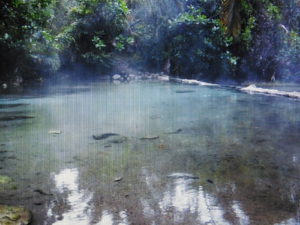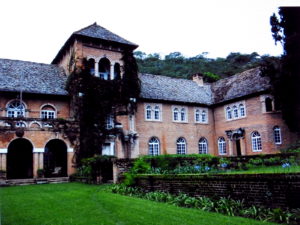03 Oct Zambia — Africa House
In 1920, a former officer in the Royal Field Artillery with and the delightfully English name of Lieutenant Colonel, Stewart Gore-Browne, DSO, moved to Northern Rhodesia and built himself an English country house at Shiwa Ngandu.
He may have picked the location for the waters, there wasn’t much else nearby. No towns and no white settlement within hundreds of kilometers. But, also, because he couldn’t afford to live in the style he wanted in England, and got a sweet deal on 30,000 acres farmland from the British South Africa Company.
The waters came in the form of Kapishwa Hot Springs, but it’s a hot springs without much of a pool, just a couple of inches of water

cooling itself in beneath tropical foliage. It’s kind of fun, though, poaching yourself on one side, then rolling over and poaching the other.
Since Gore-Browne’s time the Great North Road has pushed through Zambia, but it’s still a journey to get to Shiwa Ngandu. You start out in Lusaka then, naturally enough, head north . . . skirting swamps and tsetse flies and the Congolese border until you arrive at the hot springs. From there, you turn onto a gravel road for the last twelve miles to the house itself. It’s pretty countryside through rolling hills, thorn trees, women carrying preposterous burdens on their heads and, as you approach the house, the remnants of the citrus plantation that was the only part of the entire estate to make a profit.
Gore-Browne fitted out the house with a rose garden, a greenhouse, nursery gardens, tennis courts and, of course, the citrus plantation.

The construction continued into the 1950’s with the addition of more rooms, courtyards, a gatehouse, a tower, and colonnaded porticoes.
Inside, the place is stiff and formal, with book-lined libraries, high ceilings, and lots of heavy furniture, which pretty much expresses the taste of the man who lived there. Lt Col Stewart Gore-Browne wore a monocle, exaggerated his military bearing, dressed his retainers in uniforms, held daily muster parades, and yelled at the servants so often that they took to calling him Chipembele, the Bemba word for rhinoceros, behind his back.
But there was another side to Gore-Browne, the utopian, socialist side, who fancied his estate as a model village with its own schools, hospitals, playing fields, shops, post office and brick cottages for the workers.
He needed somebody to share all this with. Or, at least, to complete the picture of the landed gentleman he carried in his mind, and his thoughts wandered back to his youth in England.
As a young man he’d invested three years in courting Lorna Bosworth Smith, but fate had favored a man named Goldman. A few years later fate turned its back on Goldman, and on her. They both died. Their daughter, nineteen years old and also named Lorna, succumbed to Gore-Browne’s charms a lot more readily than her mother. Within a year she became Lady Gore-Brown, mistress of Shiwa Ngandu. Together they had a couple of daughters, Angela and Lorna Number Three.
Africa turned out to be a lot more remote, and a lot less romantic than Lorna Number Two had imagined in her teenaged fantasies and, a few years later, she moved to London, quit styling herself as “Lady,” and became plain old Mrs Browne.
With no other white people anywhere in the neighborhood, Gore-Browne went native. Or, at least, pro-native. For the next thirty years his best friend and constant companion was Henry Mulenga, his chauffer.
He entered politics and was elected to the Northern Rhodesia Legislative Council where he argued against segregation and in favor of letting blacks vote. He advised the African National Congress in its Marxist-Leninist Maoist struggle against the white government and, through them, became close friends with Kenneth Kaunda. Gore-Brown helped shepherd the country through independence and, when he died in 1967, became the only white person ever to receive a state funeral in Zambia. President Kaunda gave the eulogy.
The house went to Lorna Number Three, who also inherited her father’s crusading tendencies. But, since the black citizens were already citizens, her zeal turned to elephants. Which got her and her husband murdered by members of the same African National Congress her father had done so much to support. The ANC didn’t approve of coddling elephants. They needed ivory money to advance the revolution in South Africa.


No Comments